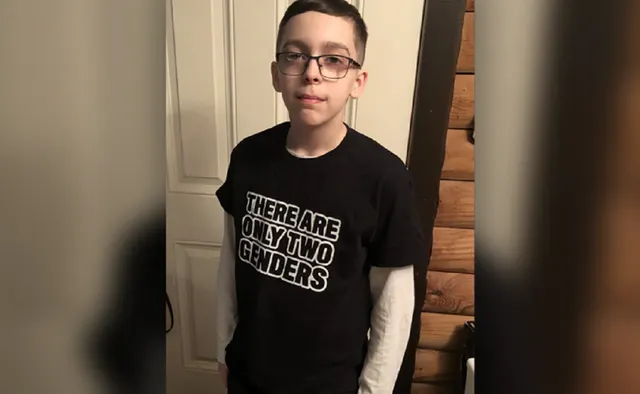**Wearing Shirt Saying ‘There Are Only Two Genders’ Not Protected Speech, Judge Says**

A Massachusetts boy in a file image. (Courtesy of Alliance Defending Freedom)
School administrators were not infringing on a student’s constitutional rights when they ordered him to remove a shirt that said “There are only two genders,” a district judge ruled on June 17.
A Massachusetts middle-schooler said the order violated his First Amendment rights to free speech and his Fourteenth Amendment rights to due process, but U.S. District Judge Indira Talwani said the violations have not been proven.
The school “permissibly concluded that the Shirt invades the rights of others,” Talwani, an Obama appointee, said.
Schools can ban speech that is in “collision with the rights of others to be secure and be let alone,” Talwani said, quoting from the 1969 ruling in Tinker v. Des Moines Indep. School Dist.
That means the administrators appropriately exercised their discretion when concluding the statement “may communicate that only two gender identities–male and female are valid, and any others are invalid or nonexistent, and to conclude that students who identify differently, whether they do so openly or not, have a right to attend school without being confronted by messages attacking their identities,” she added.
Talwani’s ruling rejected a request from the boy for a temporary restraining order that would have stopped administrators from prohibiting the student from wearing the shirt at John T. Nicholas Middle School.
The case has not been thrown out and Talwani could ultimately rule in the boy’s favor.
Lawyers for the boy did not respond to requests for comment. Lawyers for the defendants, which include acting principal Heather Tucker and Middleborough Public Schools Superintendent Carolyn Lyons, did not return an inquiry.
First Amendment expert Eugene Volokh said the ruling does not appear to be consistent with the Tinker ruling, which held that school officials in Iowa illegally ordered students to remove armbands amid protests against the Vietnam War. Lawyer Hans Bader, who is not involved in the case, said the ruling was wrong, noting that previous cases have upheld students’ rights to convey messages “as long as they weren’t vulgar or likely to cause a disruption,” including a ruling in favor of wearing a shirt that said, “Be Happy, Not Gay.”
“The judge suggested that the T-shirt interfered with other students’ ‘right to attend school without being confronted by messages attacking their identities,'” Bader said. “But other courts have refused to recognize a right to attend school without being confronted by messages attacking one’s identity, when the messages don’t disrupt school, and don’t involve ‘independently tortious speech like libel, slander or intentional infliction of emotional distress.’”
Background on Case
The middle school student, 12, whose name has not been made public, wore the shirt to school on March 21.
Tucker removed the boy from class and said other students had complained about the shirt. Tucker said the student could remove the shirt or they could go to another room to discuss the matter.
In the other room, joined by a school counselor, the student asked what the problem was. Tucker reiterated the removal order but the student said he could not in good conscience remove the shirt. Tucker then called the boy’s father, who came to pick him up.
The following day, the father emailed Lyons to inquire “why my son was removed from class and ultimately missed out on a day of class instruction.”
Lyons said she supported what she termed dress code enforcement. The content of the shirt “targeted students of a protected class; namely in the area of gender identity,” Lyons said.
Part of the dress code bars messages on clothing that “state, imply, or depict hate speech or imagery that target groups based on race, ethnicity, gender, sexual orientation, gender identity, religious affiliation, or any other classification.”
Notified of a possible lawsuit, lawyers for the school district said that the district “has, and will continue to, prohibit the wearing of a t-shirt by L.M. or anyone else which is likely to be considered discriminatory, harassing and/or bullying to others including those who are gender nonconforming by suggesting that their sexual orientation, gender identity or expression does not exist or is invalid.”
The boy was later ordered to remove another shirt he wore to school that said, “There are censored genders.”
During a public hearing, the student decried what happened, noting that the school allows posters referencing gender, including one stating people should “rise up to protect trans and GNC students,” and a rainbow flag, which is used in support of gay and transgender people.
The boy decided to wear the shirt because he believes there are only two sexes, male and female, and equates the word gender with sex, according to his lawyers.
Some of the languages from the school support this view. For instance, the student handbook says at one point that all aspects of education “must be fully open and available to members of both sexes” and at another point says that sexual harassment is defined as … “written materials or pictures derogatory to either gender.”
Lawyers for the defendants said the plaintiff neglected to acknowledge that discrimination, harassment, and bullying based on gender identity are prohibited by Massachusetts law and that school officials “have the responsibility by law to provide a safe and inclusive environment for all students.”
“By prohibiting Plaintiff from wearing the t-shirt, Defendants were properly upholding Massachusetts law and protecting the rights of all students to learn in a safe non-harassing, and inclusive environment,” they said in their opposition to the request for a temporary restraining order.
REPORTER - Zachary Stieber